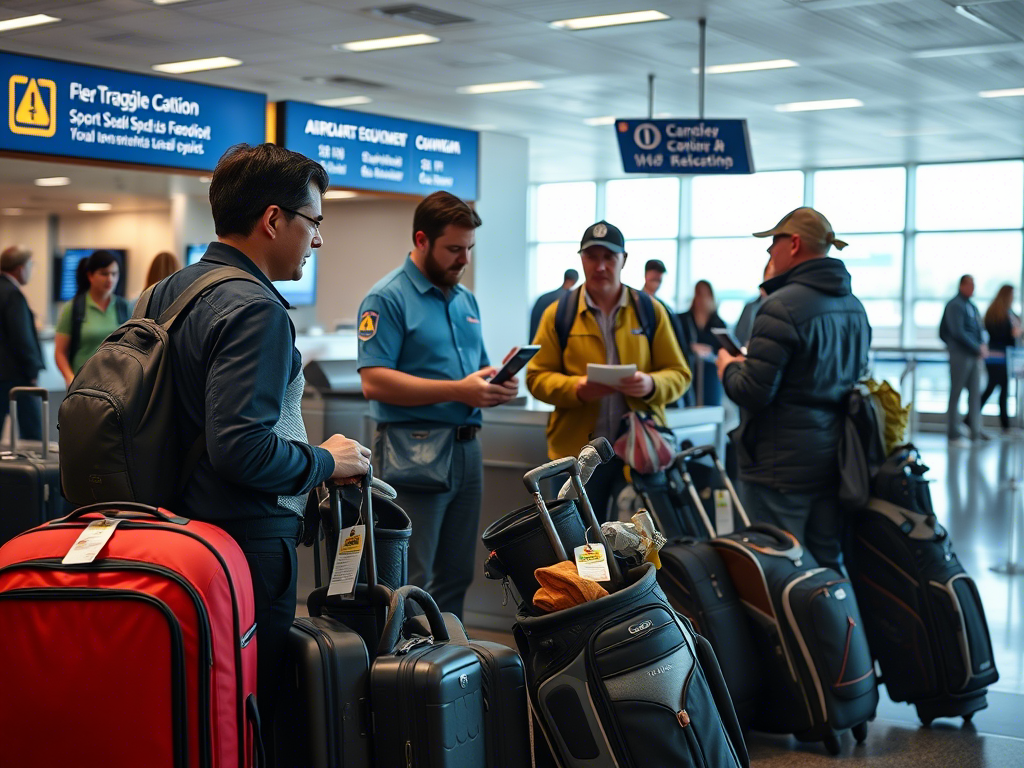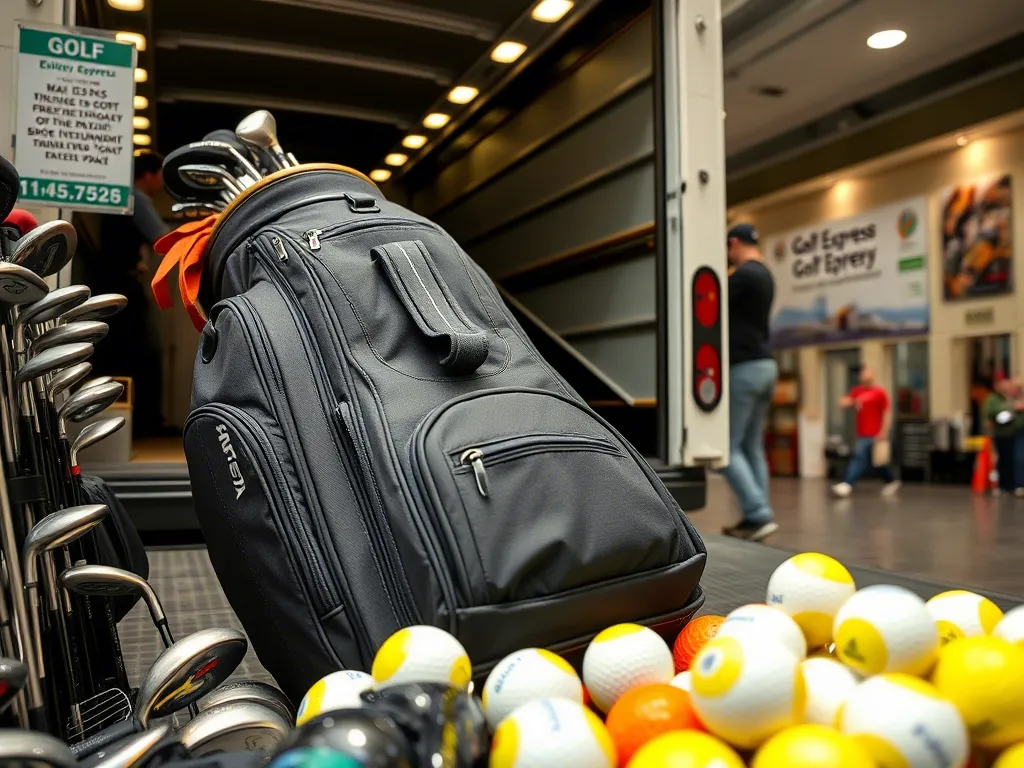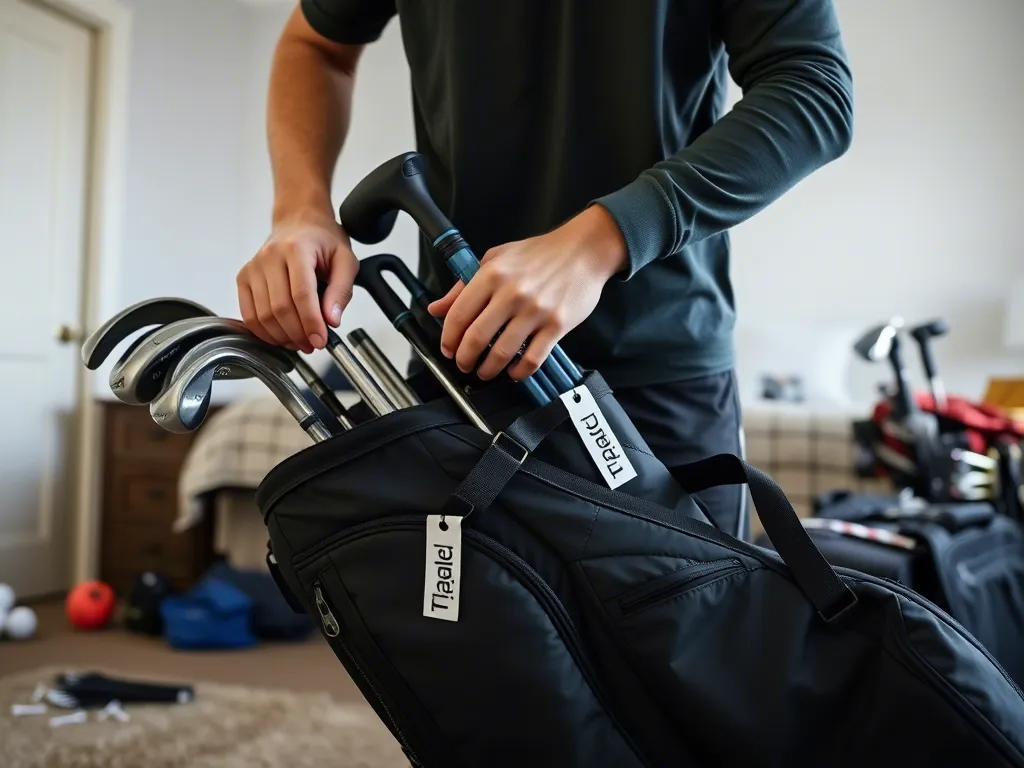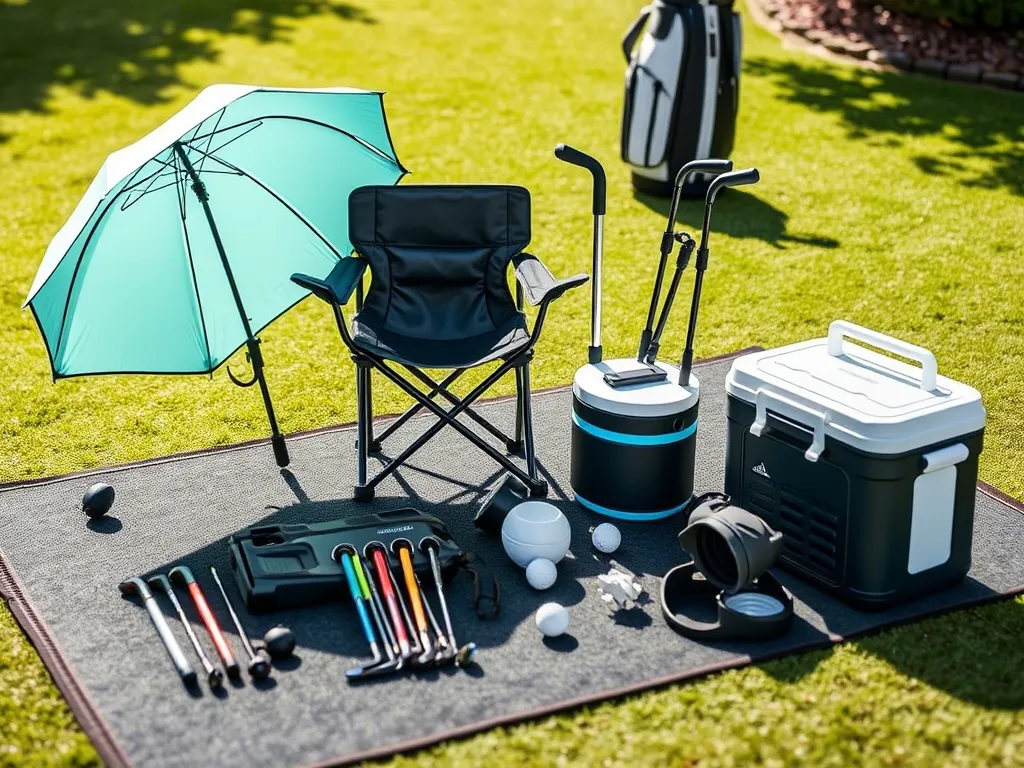To travel with golf clubs on an airplane, pack them securely in a travel golf bag (preferably hard-shell), with extra padding and a stiff arm to protect your clubs. Label the bag clearly, check airline baggage rules (fees may apply), and consider using a GPS tracker or shipping service like Ship Sticks for safer transport.
Golf clubs must be checked as baggage and packed properly in a sturdy, protective golf travel bag. Use a hard-shell case with padding and a stiff arm to keep your clubs safe during the flight.
Wrap the clubheads with towels, label your bag clearly, and add a GPS tracker like an AirTag. Most airlines allow golf bags, but if your bag weighs over 50 pounds or is longer than 62 inches, you may be charged $75 to $150 in extra baggage fees.
To avoid problems or delays, you can also use Ship Sticks to ship your golf clubs safely to your hotel or course. These tips help protect your gear and make your golf trip smooth and stress-free.
In this guide, you’ll learn how to protect your gear with a hard-shell case, use smart tools like GPS trackers, and even explore easier options like shipping your golf clubs directly to your destination.
If you’re flying domestic or international, these tips will help you avoid damage, save on costs, and keep your golf equipment ready for the first tee.

Can You Take Golf Clubs on a Plane as Checked Baggage Under Airline Sports Equipment Policies
you can take golf clubs on a plane as checked baggage under most airline sports equipment policies.
Clubs must be packed in a secure golf travel bag and typically must stay under 50 lbs and 62 linear inches to avoid oversize fees. Always check your airline’s specific rules before flying.
Are Golf Clubs Allowed on Planes as Checked Baggage
Yes, most airlines allow you to bring golf clubs on a plane, but they must be checked as baggage, not carried on. A golf travel bag is treated like a standard piece of luggage, although specific rules apply depending on the airline.
Golf bags typically qualify as special sports equipment, so they may be handled differently from regular suitcases.
Airline Weight and Size Limits for Golf Travel Bags
Most major airlines, like Delta, United, and American Airlines, allow golf bags up to 50 pounds (23 kg) and 62 linear inches (length + width + height).
If your golf bag exceeds these limits, expect to pay oversized or overweight baggage fees ranging from $75 to $150. Always check your airline’s baggage policy before booking to avoid surprises.

Differences in Rules for Domestic vs. International Golf Travel
Flying with golf clubs internationally? Be aware that baggage policies can vary by country and airline. Some international carriers may allow additional sports equipment free of charge, while others have stricter limits and higher fees.
Also, customs regulations may require you to declare your golf equipment at arrival. It’s smart to check both the departure and arrival country policies before packing your gear.
Top Tips for Traveling With Your Golf Clubs on an Airplane
Use a hard travel case, check airline baggage rules, and pack smart to avoid damage and fees. These top tips ensure safe, hassle-free transport of your golf gear.
Check Airline Baggage Fees and Golf Club Travel Policies Before You Fly
Every airline has its own rules for handling golf equipment. Before booking, visit the baggage policy page of your airline to learn if golf bags are included as standard checked luggage or if they require oversize baggage fees.
For example, Southwest Airlines includes golf bags in their standard allowance, but Delta and United may charge $75–$150 for overweight or oversized bags.
Rules also differ between domestic and international flights, so be sure to compare both ends of your trip.

Choose the Right Golf Travel Bag for Airline Protection
Using a strong golf travel case is key to preventing damage in transit.
- Hard-shell travel bags offer the most protection against crushing, especially if your clubs are flying with heavy luggage.
- Soft-sided bags are lighter and easier to store, but should be paired with a club protector like a Stiff Arm or PVC pipe.
Top recommended brands include Club Glove, Sun Mountain ClubGlider, and SKB each known for protecting gear during rough handling.
Label Your Golf Bag and Use a GPS Tracker for Safety
Always tag your golf bag with your name, phone number, email, and destination address. Include a luggage tag both outside and inside the bag.
To reduce stress, drop in a GPS tracker like an Apple AirTag or Tile to monitor your gear in real-time. These devices are lightweight, reliable, and especially helpful for layovers or if your bag gets misplaced.
Book Direct Flights to Reduce the Risk of Damage or Loss
Whenever possible, choose non-stop flights when traveling with golf clubs. Layovers and connecting flights increase the risk of your gear getting lost, delayed, or damaged due to frequent transfers.
Try to book early in the day, as early flights are less likely to be delayed, and request “fragile” or “oversized” handling at check-in.
Keep Expensive Golf Equipment in Your Carry-On
Don’t risk losing high-value gear. Items like rangefinders, golf watches, and GPS devices should be stored in your carry-on bag.
Keep a copy of receipts and serial numbers in case of damage or theft. Consider buying travel insurance that covers sports equipment or verifying if your homeowner’s insurance includes baggage protection.

Consider Shipping Your Golf Clubs Instead of Flying With Them
If you want peace of mind, use a golf club shipping service like Ship Sticks, FedEx, or UPS. These options offer insurance, tracking, and direct delivery to your hotel or golf course.
Compare prices and delivery times, especially for long trips or international travel. In some cases, it may be more convenient (and affordable) to rent golf clubs at your destination, especially if you’re only playing once or twice.
Airline Golf Bag Baggage Policy Comparison
| Airline | Golf Bag Included in Standard Baggage? | Weight Limit | Oversize Fee (if exceeded) | Notes |
| Southwest Airlines | Yes | 50 lbs | None if within limit | Golf bags are allowed as part of the two free checked bags. |
| Delta Airlines | Yes (as checked baggage) | 50 lbs | $100+ | Bag must be in a hard-sided case. |
| United Airlines | Yes (as checked baggage) | 50 lbs | $100+ | No extra oversize fee if within airline’s size limits. |
| American Airlines | Yes (as checked baggage) | 50 lbs | $150 if over 50 lbs | Oversize fees waived if bag is under 126 linear inches. |
| Alaska Airlines | Yes (as checked baggage) | 50 lbs | $100 if overweight | One golf bag counts as one checked item. |
| JetBlue Airways | Yes (as checked baggage) | 50 lbs | $150 | Golf clubs must be in a durable hard case. |
| Air Canada | Yes (as checked baggage) | 50 lbs | $100+ | Classified under sports equipment handling. |
| British Airways | Yes (within checked allowance) | 51 lbs (23 kg) | Varies by route | Must be declared at check-in; follows standard size rules. |
| Emirates | Yes (within allowance) | 50 lbs | Depends on class/ticket | Included as part of normal baggage allowance for most ticket types. |
Reference Note: Information verified from each airline’s official website and policy pages as of Q1 2024. Baggage allowances, weight limits, and fees may vary based on travel class, frequent flyer status, and international destinations. Always confirm directly with the airline before your trip to avoid unexpected charges or issues.

How To Pack Your Golf Clubs for Air Travel Safely and Effectively
Proper packing is the key to protecting your golf equipment from damage when flying. Airlines don’t guarantee the safety of your gear, so it’s up to you to secure it using smart, practical steps. Here’s how to do it right:
Remove Adjustable Golf Club Heads Before Air Travel
If your driver, fairway woods, or hybrids have adjustable heads, it’s best to remove them before packing.
Place the heads in a padded pouch and store them in your carry-on, along with the adjustment tool. This helps prevent snapping or bending during transit, especially when bags are stacked or dropped by handlers.
Wrap Golf Clubs with Towels or Bubble Wrap to Prevent Impact
To protect the shafts and heads, wrap each club with soft towels, bubble wrap, or thick clothing.
This creates a cushioning layer to absorb shock during loading and unloading. Focus especially on the driver and putter two of the most commonly damaged clubs during flights.
Add Internal Padding Inside Your Golf Bag to Limit Movement
Movement inside the bag is one of the biggest causes of damage during air travel. Fill empty spaces with soft materials like socks, clothes, or foam padding to stop the clubs from shifting. You can also group clubs together using rubber bands to add stability.
Store Loose Golf Accessories in Separate Compartments or Carry-On
Keep items like golf balls, tees, rangefinders, gloves, and shoes in a separate zipper pocket inside the bag, or better yet, in your carry-on. This reduces weight in the main compartment and prevents small accessories from causing damage if they shift during the flight.
Use TSA-Approved Locks on Your Golf Travel Bag for Security
Always secure your bag with a TSA-approved lock, especially if you’re traveling through airports with strict security screening.
These locks allow TSA agents to inspect your bag without damaging the zipper or case. Also, use a luggage tag with your name, number, and destination.

Take Photos of Your Golf Gear Before You Check It In
Before checking in your golf bag, take clear photos of the clubs and the full bag from different angles. This acts as proof of condition if you need to file a damage claim.
It also helps document which clubs you packed in case something goes missing during the trip.
What Golf Gear To Pack for a Trip: Essentials, Accessories, and Travel Tips
Packing smart for a golf trip saves time, space, and stress. If you’re flying cross-country or heading abroad, making sure you bring the right golf gear and leave out the extras can help you stay focused on your game. Here’s how to do it right.
Golf Travel Packing Checklist: Clubs, Balls, Gloves, and More
Start with the basics. Your golf club set (driver, irons, wedges, putter) is essential. Pack extra golf balls (especially if you’re playing unfamiliar courses), tees, gloves, and a golf towel.
Don’t forget spikeless golf shoes that are easy to travel with, and pack an extra scorecard holder or yardage book if you use one.
Weather-Ready Golf Gear: What to Pack for Rain or Cold Conditions
Always check the forecast at your destination. For rainy or cold rounds, bring rain gloves, a lightweight rain jacket, an umbrella, and waterproof headwear. In humid climates, cooling towels, sun sleeves, and high-SPF sunscreen are must-haves. Keeping weather gear handy makes your game more consistent and comfortable.
Must-Have Golf Accessories vs. Optional Add-Ons for Travel
Keep your bag light by focusing on must-have gear: clubs, gloves, shoes, balls, and weather protection.
Leave behind non-essentials like swing trainers, heavy ball retrievers, or extra gadgets unless you know you’ll need them. If you’re short on space, consider renting accessories like push carts or rangefinders at your destination.

Compact and Travel-Friendly Golf Accessories to Save Space
Choose travel-size golf accessories to reduce bulk. Pack a collapsible ball marker, foldable shoe bag, portable divot tool, and mini brush cleaner.
Many golf accessories now come in compact, TSA-friendly designs that fit easily into soft travel bags or carry-ons, keeping your packing efficient and organized.
Golf Travel Packing Checklist: Essentials, Optional Gear, and Travel Notes
| Item | Category | Travel Tip |
| Full set of golf clubs | Must-Have | Pack in a hard-shell travel case; remove adjustable heads |
| Golf balls (minimum 12) | Must-Have | Bring extra if playing new or water-heavy courses |
| Golf tees | Must-Have | Lightweight; store in a small zip pouch |
| Golf gloves (2-3 pairs) | Must-Have | Bring backups for wet or humid conditions |
| Golf shoes (spikeless) | Must-Have | Easier to pack and airport-friendly |
| Golf towel | Must-Have | Attach to bag or fold inside |
| Rain jacket and umbrella | Weather Gear | Compact, waterproof gear is ideal for unpredictable weather |
| Rain gloves | Weather Gear | Improves grip in wet conditions |
| Cooling towel or sun sleeves | Weather Gear | Great for warm/humid destinations |
| Rangefinder or GPS device | Optional Gear | Carry in your hand luggage; check battery rules for flights |
| Ball marker/divot tool | Travel Accessory | Choose compact versions with clip-on features |
| Sunscreen (travel-size) | Travel Accessory | Must be under 100ml if in carry-on; high SPF recommended |
| Club brush/cleaner tool | Travel Accessory | Use a mini or foldable version for easier packing |
| Shoe bag (foldable) | Travel Accessory | Keeps dirty shoes away from clean gear |
| Scorecard holder | Optional Gear | Useful for tournaments or if not provided at the course |
Reference Note:
This checklist is based on equipment guidelines from PGA.com, Golf Digest, and manufacturer travel kits from brands like Callaway, Titleist, and Sun Mountain (2023–2024 models). Specific travel tips are tailored for air travel, TSA rules, and international packing standards. Always confirm airport and airline restrictions before departure.
FAQs
Can Golf Tees and Divot Tools Go Through TSA?
Yes, according to the Transportation Security Administration (TSA), golf tees and divot tools are permitted in both carry-on and checked bags. However, it’s always advisable to check the latest TSA guidelines before traveling to ensure compliance with any updates.
Can You Carry a Putter on a Plane?
No, golf clubs, including putters, are not allowed in carry-on luggage due to their potential use as bludgeoning instruments. They must be transported in checked baggage. Ensure your clubs are properly packed in a sturdy travel case to prevent damage during transit.
Can You Lock Your Golf Bag When Flying?
Yes, you can lock your golf bag, but it’s recommended to use TSA-approved locks. These locks can be opened by TSA agents if an inspection is required, preventing potential damage from forced entry. Non-TSA-approved locks may be cut off if your bag needs to be inspected.
What Happens If Your Golf Clubs Get Damaged?
If your golf clubs are damaged during air travel, report the damage to the airline immediately upon arrival. Most airlines have specific time frames within which damage must be reported, often within 24 hours.
Providing photos of your equipment before and after the flight can support your claim. Note that airlines may have liability limits and may not cover damage resulting from improper packing.
Can You Bring Golf Balls in Carry-On Luggage?
Yes, golf balls are allowed in both carry-on and checked luggage. They are not considered hazardous and can be transported without restrictions. However, always check with your airline for any specific policies or limitations.
Are There Travel Insurance Options for Golf Clubs?
Yes, several travel insurance providers offer coverage for sports equipment, including golf clubs. Policies may cover loss, theft, or damage during your trip.
It’s important to review the terms and coverage limits of the policy to ensure it meets your needs. Some providers also offer additional services like concierge assistance for tee time bookings.
Do Golf Bags Count as One Checked Bag?
Generally, airlines count a golf bag as one piece of checked luggage. However, policies can vary between airlines.
Some may include golf bags in the standard baggage allowance, while others may charge additional fees. It’s essential to check your airline’s specific baggage policies before traveling.
Should You Declare Golf Clubs for International Travel?
When traveling internationally, you typically do not need to declare golf clubs if they are for personal use and will be brought back with you.
However, if you are importing new equipment or plan to leave the clubs in the destination country, you may need to declare them and pay applicable duties or taxes. Always check the customs regulations of the country you’re visiting to ensure compliance.
What is the best type of travel bag for golf clubs?
How do I handle damaged golf clubs after a flight?
If your golf clubs are damaged after a flight, report the issue to the airline immediately. Take photos of the damage and provide any necessary documentation. File a claim with the airline and follow up to ensure the issue is resolved.
Conclusion
Traveling with golf clubs on an airplane might take extra planning, but nothing beats the feel of your own clubs when you step onto a new course.
Bringing your personal golf equipment means better performance, more confidence, and no surprises when it matters most.
Yes, it takes effort checking airline baggage rules, choosing the right golf travel bag, using club protectors, and maybe even insuring your gear. But that preparation gives you peace of mind, knowing your clubs are safe, secure, and ready to play.
And who knows? Your best round might be waiting on the other end of that flight.
Looking to take the stress out of your next golf trip? Bookmark this guide, share it with a fellow golfer, or check your airline’s current policies before you pack. Smooth travel starts with smart choices and now you’re ready to swing with confidence.
How I Pack My Golf Travel Bag For Airline Travel
Posts References:
Traveling with golf clubs
Tips for checking clubs on flight